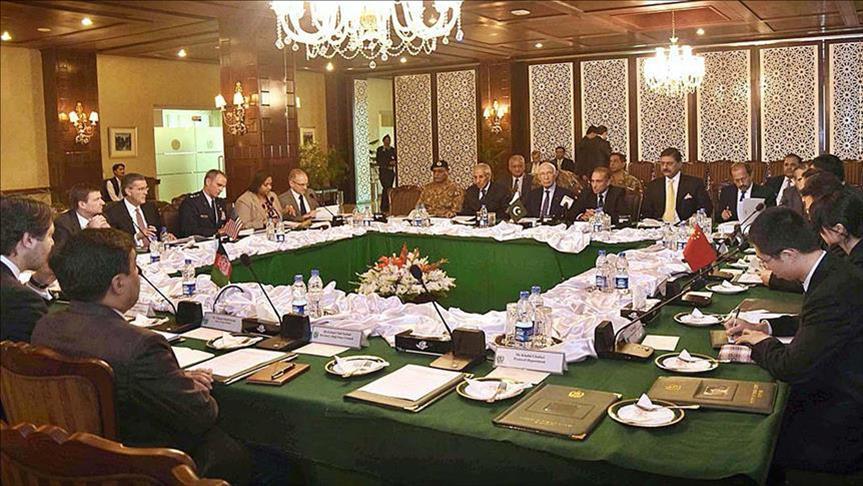Kabul draws closer to Moscow before Afghanistan summit
International conference on Afghanistan in Moscow Friday will be attended by representatives of Pakistan, Iran, India, China
 file photo
file photo
By Shadi Khan
KABUL, Afghanistan
Kabul appears to have softened its stance on Russia’s alleged support for the Taliban as Moscow prepares the stage for an international conference on Afghanistan on Friday.
Representatives from Pakistan, Iran, India, China and several other former Soviet central Asian countries have confirmed their participation in the highly anticipated talks, which some observers say may pave the way to peace in Afghanistan despite the absence of the U.S.
Deputy Foreign Minister Hekmat Khalil told Anadolu Agency the government was convinced that the 16-year conflict cannot be resolved militarily.
The Foreign Ministry added that Afghanistan and Russia had developed amicable relations and effective cooperation on combating terrorism and drug smuggling.
“Relations will not get affected by the propaganda launched by some individuals through the free press and media because the diplomatic organ is the main and principal entity of the Afghan government,” the ministry said in a statement released Tuesday.
Meanwhile, Russian President Vladimir Putin said Russia would help Afghanistan get on track towards peacefully resolving its internal problems and development.
However, he described the terror threat emanating from Afghanistan as “very serious”.
“As far as the Taliban is concerned, many countries have contacts of one form or another with this organization,” the Russian leader told Mir television, according the Kremlin on Wednesday.
He said Russia wanted to develop relations with “all” forces in Afghanistan based on three principles: the recognition of Afghanistan’s constitution, disarmament, and reaching full national accord.
High hopes in India
“Our view is that by assisting Afghanistan’s legitimate government, together with other participants in the settlement process, we will eventually achieve reconciliation there,” he said.
According to Indian experts, the Moscow conference will be very important for India, which shares a close relationship with Afghanistan.
Defense analyst Krishna Jha said India supports “every effort to stabilize situation in Afghanistan and fight against terrorism.
“The Indian government has invested heavily in Afghanistan, so they are hoping that the situation improves and all stakeholders come to the table for peace talks.”
India often accuses Pakistan of supporting the Afghan Taliban for its own interests, while Pakistan accuses India of using proxies in Afghanistan to destabilize Islamabad.
Tahir Khan, an Islamabad-based expert, said the Moscow-led peace initiative was unlikely to yield immediate fruit due to the absence of the U.S., which holds the key to the Afghan situation.
However, he said, the Russian summit, supported by most concerned parties, including Kabul, was a way toward a regional solution to the post-9/11 war.
“America has refused to attend the conference because it appears to be confused over Russia's initiative,” Khan told Anadolu Agency. “If Washington attended the conference that would mean it recognized Moscow's diplomatic supremacy.”
He added that Washington cannot afford to stay away from the process for long as its strategy to date has failed to bring peace to Afghanistan.
“Sooner or later, it will have to join the process,” Khan said.
U.S. State Department spokesman Mark Toner said Thursday that Washington would not be represented at the conference because "it was unclear to us what the purpose was.”
"It seemed to be a unilateral Russian attempt to assert influence in the region that we felt wasn't constructive at this time," Toner said.
The spokesman added that the Taliban has "no viable alternative but to enter into direct talks" to achieve its goals.
"Going forward we do plan to work with Russia and other key regional stakeholders to enhance dialogue on Afghanistan," Toner said.
U.S. non-participation is not necessarily a bad omen for Washington-Moscow ties in the Middle East or U.S. engagement in Afghanistan specifically, according to Richard Weitz, director of the Center for Political-Military Analysis at the D.C.-based Hudson Institute.
"So far, the Trump administration has supported the Astana talks [in Syria] and seems open to Russian peace efforts as long as there is no Russian military support for the Taliban," Weitz told Anadolu Agency in a statement.
As for the Russian initiative's chance of success with the U.S. absent from the table, Weitz said: "It is very hard whether or not the U.S. is involved in the peace process, given the differences between the Taliban and the Afghan government.
"China, Iran, Pakistan, and India will also press to have their interests respected," he added.
* Shuriah Niazi in New Delhi, Aamir Latif in Karachi, as well as Anadolu Agency correspondents Diyar Guldogan in Ankara and Canberk Yuksel in New York contributed to this report.
Anadolu Agency website contains only a portion of the news stories offered to subscribers in the AA News Broadcasting System (HAS), and in summarized form. Please contact us for subscription options.







